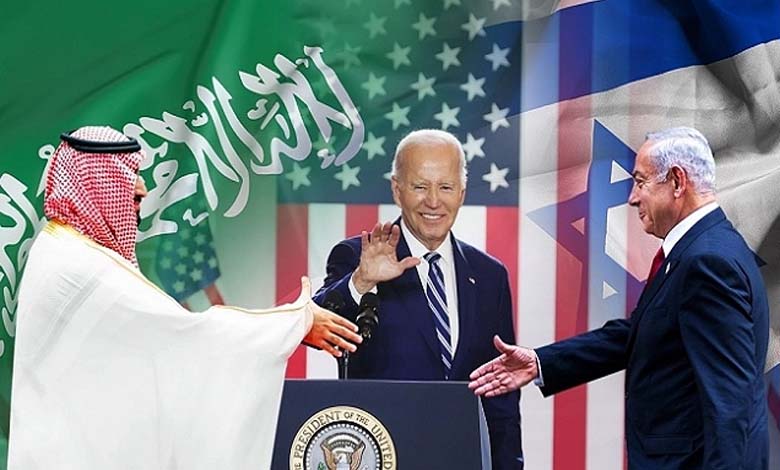Washington Seeks Normalization Between Israel and Saudi Arabia Before Presidential Elections
U.S. Secretary of State Antony Blinken’s desire to finalize a normalization agreement between Riyadh and Tel Aviv, based on conditions set by the Kingdom, faces resistance from Netanyahu.

On Thursday, Antony Blinken stated that he still hopes for a normalization agreement between Israel and Saudi Arabia before President Joe Biden‘s term ends in January. He added during a press conference in Haiti, “I believe that if we can reach a ceasefire in Gaza, we can move forward on the path to normalization.”
-
Saudi Arabia denies and denounces Israel’s settlement decision near East Jerusalem
-
US and Germany as Exceptions: 6 Western Countries Restrict Arms Sales to Israel
For months, the U.S. administration has hoped that Netanyahu would secure the “long-sought prize” of normalization with Riyadh as part of a comprehensive agreement aimed at ending the Gaza war and addressing entrenched regional divisions. However, the Israeli government continues its escalation.
In June, Saudi Ambassador to the UK, Prince Khalid bin Bandar bin Sultan, stated that his country would not normalize relations with Israel at the expense of the Palestinian people. Riyadh insists on its firm stance that no diplomatic relations with Israel will be established unless Israel recognizes the Palestinian state within the 1967 borders with East Jerusalem as its capital, halts aggression on Gaza, and withdraws all Israeli occupying forces from Gaza.
-
Exchange of Accusations Between Israel and Hamas Over the Killing of Six Hostages
-
Washington Post reveals how Lebanese pay the price for Iranian threats and ongoing Hezbollah-Israel clashes
The Kingdom has also demanded a mutual defense agreement as a condition for moving forward with normalization, while American officials have revealed progress in this regard.
Since the outbreak of events in Gaza, Saudi Arabia and other Arab and Islamic countries have led high-level diplomatic efforts to urge the international community to find an urgent and comprehensive solution that meets the aspirations of the Palestinian people. They have also emphasized the importance of a comprehensive and just settlement of the Israeli-Palestinian conflict.
-
Gaza War: How Did “Amazon” Contribute to the Precision of Israeli Airstrikes?
-
Hezbollah Bets on Tunnel Warfare in Confrontation with Israel
Riyadh has specifically called on the international community, especially the permanent members of the Security Council who have not yet recognized the Palestinian state, to expedite the recognition of the Palestinian state within the 1967 borders with East Jerusalem as its capital, so that the Palestinian people can obtain their legitimate rights and a comprehensive and just peace can be achieved for all.
However, these efforts face Israeli intransigence. Former CIA Director David Petraeus stated that the “major obstacle” to normalizing relations between Israel and Saudi Arabia is the two-state solution to the Israeli-Palestinian conflict, adding that this solution is currently “out of reach.”
-
Hostage Operations: How Does Israel Gather Intelligence in Gaza?
-
Can Israel Deter Hezbollah? Dark Scenarios for a Potential Confrontation
In a previous statement to CNBC, Israeli Prime Minister Benjamin Netanyahu expressed his opposition to the two-state solution, which was first promoted in the Oslo Accords and supported by many international actors. He said, “The two-state solution that people are talking about would essentially be the greatest reward for terrorists.”
On the other hand, Blinken stated that Israel and the Palestinian Islamic resistance movement (Hamas) need to resolve the remaining issues to reach a ceasefire agreement in Gaza.
-
Jerusalem Post: Cyber Attacks as Iran’s Means to Respond to Israel Before Missile Strikes
-
Israel Announces End of Military Operations in Gaza
He explained in a press briefing, “From what I’ve seen, about 90 percent of the issues have been agreed upon, but there are a few crucial issues still pending,” including the so-called Philadelphi Corridor at the southern end of Gaza on the border with Egypt.
He also mentioned some disagreements on how to exchange Israeli hostages for Palestinian detainees.
Blinken added, “I expect in the coming days that we will convey to Israel, and that Qatar and Egypt will convey to Hamas, our ideas, the three of us, on how to resolve the remaining outstanding issues.” The U.S., Qatar, and Egypt are mediating between the two parties.
-
Between Sinwar’s Approval and Israel’s Rejection… An Uncertain Fate Awaits Gaza Truce Negotiations
-
Fearing Devastating Effects, Iranian President Urges Supreme Leader Not to Attack Israel
President Joe Biden proposed a three-phase ceasefire plan on May 31, but disagreements persist, hindering the conclusion of a final ceasefire agreement and the release of hostages held in Gaza.
Hamas rejects any Israeli presence in the Philadelphi Corridor, while Netanyahu insists that Israel will not withdraw from it.
This week, Turkey, five Arab countries including Saudi Arabia, and the Palestinian Authority joined Egypt in rejecting Israel’s request to keep forces in the Philadelphi Corridor.
-
Hamas After the Bombing of Khadija School: Israel Lies and Does Not Want to Stop Its Aggression
-
After Israel’s Attack on Hodeidah… Houthi Threats to Continue Targeting International Ships
In response to whether it is still possible to normalize relations between Israel and Saudi Arabia, the U.S. Secretary of State said, “There is still a chance” to do so if a ceasefire in Gaza is achieved.
This latest round of the Israeli-Palestinian conflict, which has lasted for decades, erupted on October 7 when Hamas launched an attack on Israel, resulting in 1,200 deaths and approximately 250 hostages according to Israeli statistics.
Since then, the ongoing Israeli assault on Gaza has resulted in more than 40,000 Palestinian deaths, according to the local health ministry, and has forced almost all of Gaza’s 2.3 million residents to flee.












